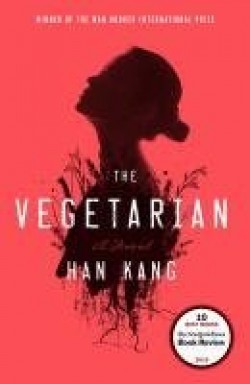meeg reviewed The vegetarian by Han Kang
Review of 'The Vegetarian' on 'Goodreads'
5 stars
I've seen this book on our hold shelf for weeks and was always struck by the cover. But oddly enough, I never actually picked up the book to read its summary. I was flying blind with this one once it arrived on the hold shelf for me and had absolutely no idea what I was in for with Han King's The Vegetarian.
In part one, we meet Yeong-hye through the narration of her husband, Mr. Cheong, as he observes his wife become increasingly unwell as a result of her gruesome, gory nightmares. One morning, before sunrise, he finds her in the kitchen throwing away all of the meat in their house: eel, beef for shabu shabu, pork belly, and oysters all because she "had a dream." We watch Yeong-hye begin to unravel without the support of her husband, sister, or parents, who see her rapid switch to vegetarianism as a fussy rebellion against the family and not an indicator of something deeply, deeply wrong. Part one climaxes at an intervention-style, meat-centric family dinner, where we watch the family completely fall apart.
Part two is narrated by Yeong-hye's brother-in-law, Yeong-ho, who becomes infatuated with Yeong-hye after his wife, In-hye, tells him that her sister was born with a "Mongolian mark" (a blue, thumb-sized birthmark on her buttocks), which always set her apart. This section of the book feels the most violating-- while we're let into the brutally honest minds of Mr. Cheong and Yeong-hye in part one, we're given an even deeper lens into the predatory, and sad mind of Yeong-ho as he becomes obsessed with Yeong-hye while she's at her most vulnerable.
Part three is the ebb in the tide, narrated by In-hye, Yeong-hye's sister. Although there's plenty of drama left for the last 50 pages, this part seems much more quiet and intimate, and by far the saddest arc of the story. I was so struck by this honest portrayal of grief and guilt, and the difficulty in accepting a life someone has chosen for themselves when it's not something you ever would have chosen for them.
I'm so surprised by how much I love this book; it's such a dark and twisted story ruminating on the intersections of family, violence, abuse, mental illness, societal expectations, gender, power, choice, and food. Similar to movies like The Witch and Antichrist, and books like Universal Harvester and Uzumaki, Han Kang crafts a brutally honest masterpiece of a family in disrepair that we (the readers) feel deeply unsettled while reading, like we've inserted ourselves as active watchers of something we shouldn't be seeing.
There are so many things I'm thinking about after reading this story, and I'm so impressed by Kang's incredible nuance in bringing these questions to the surface. How do we process trauma both inside and outside of ourselves? How do we let people in when we don't always know who they are? Conversely, how do we know when to let people go when they've already made the choice to leave? How does the patriarchy reinforce trauma? How can we have any semblance of control in the spheres of society, family, and even our own brains?

